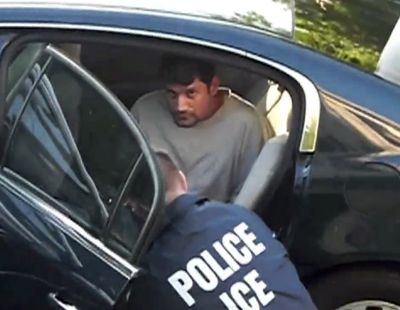Money trail yields arrests
Pakistanis accused of supplying funds to bombing suspect

WATERTOWN, Mass. – Three Pakistani men who authorities say supplied funds to Times Square car bomb suspect Faisal Shahzad were arrested Thursday in a series of raids across the Northeast as the FBI followed the money trail in the failed attack.
Investigators said it was not yet clear whether the three men knew how the money was going to be used.
The men – two seized in the Boston area, one in Maine – were arrested as federal authorities searched homes and businesses in a coordinated series of raids centered in the Boston suburbs, on New York’s Long Island and in New Jersey.
They were arrested on immigration violations – administrative, not criminal, charges. They were not charged with any terrorism-related crimes. Their names were not released.
The raids resulted from evidence gathered in the investigation into the Times Square bomb attempt two weeks ago.
In Washington, Attorney General Eric Holder said investigators believe there is evidence that the men were providing Shahzad, a Pakistan-born U.S. citizen, with money, but they have yet to determine whether the men knew the funds might have been intended for a terrorist act.
A top Massachusetts law enforcement official, who spoke on condition of anonymity because the investigation is still going on, said investigators are not sure whether the two Boston-area men were witting accomplices or simply moving funds, as is common among people from the Middle East and Central Asia who live in the U.S.
“These people might be completely innocent and not know what they were providing money for,” the official cautioned, “but it’s clear there’s a connection.”
U.S. Sen. Susan Collins, R-Maine, said there was “not a direct tie” between the man arrested in South Portland, Maine, and the Times Square car bomb suspect.
Authorities have been investigating whether Shahzad – who authorities say needed only a few thousand dollars to buy the used SUV and the bomb components used in the attempted May 1 attack – was financed from overseas.
A federal law enforcement official, speaking on condition of anonymity, said money was passed to Shahzad through the informal transfer networks known as hawalas.
Muslim immigrants for years have used hawalas, which rely on wire transfers, couriers and overnight mail and are cheaper and quicker than banks, to send cash to their families overseas. But since the Sept. 11, 2001, attacks, authorities have worked to dismantle the system, fearing it allows terrorists to raise and launder money.
Tracking the money to Shahzad through a hawala system will involve interviewing a large number of people and will likely be a more difficult task than would tracing funds through more conventional financial networks, the official said.
Two of the men under arrest overstayed their visas and the third is already in removal proceedings, said another law enforcement official.
Shahzad, 30, has waived his right daily to appear in court since his May 1 arrest on charges he tried to blow up an SUV van packed with gasoline and propane outside Times Square’s busy restaurants and Broadway theaters, U.S. Attorney Preet Bharara said Thursday. He is continuing to provide investigators with information, Bharara said.
“We are doing exactly what, I think, people want us to do, and that is to make sure we get all the information we can with respect to any associates he may have, and other information that would help us to prevent anything further from happening in the United States,” the prosecutor said.
Kifyat Ali, a cousin of Shahzad’s father, has called Shahzad’s detention “a conspiracy so the (Americans) can bomb more Pashtuns,” a reference to a major ethnic group in Peshawar and the nearby tribal areas of Pakistan and southwest Afghanistan. He has insisted that Shahzad “was never linked to any political or religious party” in Pakistan.
Shahzad, a budget analyst who lives in Bridgeport, Conn., returned to the U.S. in February from five months in Pakistan, where authorities say he claims to have received training in making bombs.
A law enforcement official called Thursday’s raids “an evidence-gathering operation” and not a search for suspects. The official, speaking on condition of anonymity, said officials are investigating whether Shahzad got his cash through illegal money transfers.